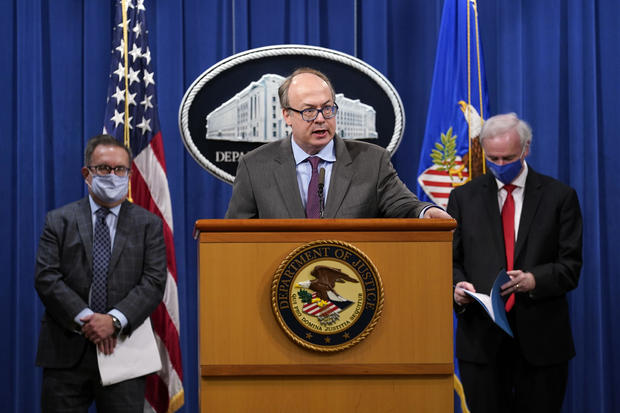▶ Watch Video: House committee issues subpoenas to organizers of January 6 Stop the Steal rally
Washington — The Senate Judiciary Committee on Thursday released a new report shedding further light on former President Donald Trump’s relentless efforts to enlist the Justice Department to challenge the results of the 2020 presidential election over baseless claims of election fraud.
Drawing from documents and interviews with three Justice Department officials who were in top roles during Mr. Trump’s final chaotic weeks in office, the 394-page report is the latest that seeks to recount the former president’s attempts to remain in office by asserting without evidence claims of election fraud.
Senate Judiciary Committee Chairman Dick Durbin, a Democrat from Illinois, said in a statement the report shows “just how close we came to a constitutional crisis,” but credited Justice Department leaders with standing firm against his pressure campaign.
“Donald Trump would have shredded the Constitution to stay in power. We must never allow this unprecedented abuse of power to happen again,” Durbin said.
Republicans on the committee released their own report to counter Democrats’ findings. Senator Chuck Grassley of Iowa, the top GOP member of the Judiciary panel, said transcripts from the probe paint a picture that differs starkly from Democrats’ claims that Mr. Trump attempted to weaponize the Justice Department to overturn the election results.
“The available evidence shows that President Trump did what we’d expect a president to do on an issue of this importance: he listened to his senior advisors and followed their advice and recommendations,” Grassley said in a statement.
The report from the Judiciary Committee’s majority details an hours-long meeting in the Oval Office on January 3, when Mr. Trump gathered with acting Attorney General Jeffrey Rosen, acting Deputy Attorney General Richard Donoghue, Assistant Attorney General Steven Engel, White House counsel Pat Cipollone, his deputy, Patrick Philbin, and Justice Department official Jeffrey Clark, a key figure in raising doubts about the integrity of the election with the president.

During the meeting, Donoghue and Engel told the president there would be mass resignations from the Justice Department if he replaced Rosen with Clark, who was pushing claims about election irregularities in Georgia, according to the report. Cipollone, who also threatened to resign, told Mr. Trump his plans to fire Rosen and install Clark amounted to a “murder-suicide pact,” Donoghue recalled in an interview with the committee.
Clark urged Justice Department leaders to intervene in Georgia’s elections and sent Rosen and Donoghue a draft letter in late December claiming the department identified “significant concerns that may have impacted the outcome of the election in multiple states.” The letter called for the Georgia legislature to consider appointing a new slate of presidential electors, according to the committee report.
But Rosen and Donoghue rejected Clark’s proposal to send his letter, according to documents and testimony given to the committee. Still, Clark attempted to use the letter, and his closeness to the president, as leverage over Rosen, according to the report.
In one instance, Clark told Rosen and Donoghue that Trump offered to replace Rosen as the acting attorney general with him, but said he would reject the offer if Rosen signed his letter about the Justice Department’s purported concerns about election irregularities in Georgia.
The report provides further details about Mr. Trump’s interactions with the Justice Department as he sought to undermine the results of the presidential election and questioned why department officials weren’t doing more to address baseless claims of election fraud.
The committee found there were at least three calls between Mr. Trump and Rosen alone in a seven-day span in late December, as well as three meetings in the Oval Office between the president, Rosen and Donoghue.
White House chief of staff Mark Meadows also asked Rosen to open investigations into allegations of election fraud in Georgia and New Mexico, as well as an outlandish theory pushed by Rudy Giuliani that an Italian contractor used military satellites to manipulate voting machines and flip votes cast for Mr. Trump to President Biden.
The extent of Mr. Trump’s efforts to challenge the results of the 2020 presidential election sounded alarm bells throughout the top ranks of the Justice Department, the report from the Judiciary Committee and an earlier probe from the House Oversight and Reform Committee indicate.
In one instance, the U.S. attorney in Atlanta, Byung Jin Pak, resigned as Mr. Trump and his allies advanced their claims of election fraud. But the Senate Judiciary report found it was the president who forced Pak’s resignation, as he believed he wasn’t doing enough to address his baseless allegations.
After Pak investigated and debunked Mr. Trump’s theories about election fraud in Georgia, the president claimed he was a “Never Trumper” and told Rosen and Donoghue on January 3 that he wanted Pak fired, according to the committee.
But Donoghue said Pak planned to resign, and the former president agreed not to fire him if he stepped down the following day. Pak, however, had no plans to leave and intended to remain in his role as U.S. attorney until the inauguration.
While a federal prosecutor named Kurt Erskine was set to succeed Pak, as he was first assistant U.S. attorney, the president told Donoghue he was interested in another U.S. attorney in Georgia, Bobby Christine, to replace Pak, as he thought he would “do something” about the election fraud claims.
The Judiciary Committee’s report makes a number of recommendations intended to shield the Justice Department from future political controversies. But the panel also suggested that some issues that arose during its investigation extend beyond its purview, and should be examined by the House Select Committee investigating the January 6 assault on the U.S. Capitol.
The committee said Mr. Trump’s efforts to use the Justice Department as part of his attempt to reverse the results of the 2020 election were aided by allies with ties to the “Stop the Steal” movement and the January 6 attack. The report names three of these allies with January 6 connections that are “notable”: Congressman Scott Perry of Pennsylvania, Pennsylvania state Senator Doug Mastriano and conservative attorney Cleta Mitchell.
“These ties warrant further investigation to better place Trump’s efforts to enlist DOJ in his efforts to overturn the presidential election in context with the January 6 insurrection,” the report states.
Perry, who led the objection to Pennsylvania’s electoral votes when Congress convened to reaffirm Mr. Biden’s victory January 6, introduced Clark to Mr. Trump. Perry also spoke on the phone with Donoghue on December 27 and said the Justice Department was not doing its job with respect to the election, the committee found. The GOP congressman emailed Donoghue documents detailing claims about election fraud in Pennsylvania, many of which had already been debunked.
While the Senate Judiciary panel received calendars, emails and other documents from the Justice Department as part of its investigation into Mr. Trump’s election scheme, the National Archives has yet to respond to the committee’s request for additional records from the Trump White House.
The committee continues to probe Mr. Trump’s attempts to involve the Justice Department in his efforts to reverse the election results.







